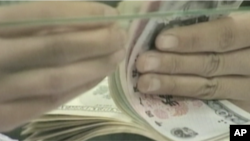Market analysts say The New York Stock Exchange and other world markets are extending a rally Monday which began after China announced it would allow its currency to appreciate against the U.S. dollar. Critics say the Chinese have kept it unofficially low to boost their exports. A stronger yuan will make imports, including American goods, more affordable for Chinese buyers.
From New York to Hong Kong, stocks rallied Monday following China's announcement over the week-end that it would allow its currency to trade more flexibly, but still within a narrow band. Analysts welcomed the move, saying the yuan -- also known as the "renminbi" or "RMB" -- has been shackled to the U.S. dollar for nearly two years.
Wang Tao, a chief economist with UBS in China, said, "The timing I think at the moment seems pretty good in a sense that China's economy is pretty strong and global recovery is pretty clear, despite all the uncertainties related to the European debt crisis."
Many average Chinese also welcomed the news, saying it will increase their purchasing power. "It will be cheaper for us ordinary people to buy things or travel abroad. Its purchasing power will be strengthened if the RMB appreciates," said one man in a Chinese bank.
As analysts expected, China's yuan exchange rate increased and on Monday hit a 5-year high. Analysts say despite the spike, they expect exchange rate reform to be gradual.
Wang Tao said, "The move is really a return to a sort of managed flow/We think it's going to be a visible, probably appreciation, against the U.S. dollar within the trading band."
Zhou Shijian, A Senior Fellow at the Center for U.S. China Relations at Tsinghua University, agrees. "The currency reform is to increase the flexibility of the RMB, that doesn't mean a dramatic appreciation," he said.
China's announcement that it is resuming yuan reform comes as economic policy makers from the Group of 20 nations representing the world's most important economies head for their summit this week-end in Canada. China's currency policies have been intensely criticized by countries who say the yuan has been undervalued for China's own benefit.
Jon Huntsman, the U.S. ambassador to China, called the move "a genuine attempt by China to address its exchange rate mechanism." "I think it takes an irritant off the table in the U.S. China relationship," he said.
Beijing has long refused to allow its currency to float. But the government now says the yuan's value will rely on a so-called "basket" of currencies and not just the U.S. dollar.
As markets have rallied worldwide, China's move appears to have brought a ripple of hope, in what has been a sea of uncertainty.
Global Markets Rally on Chinese Currency Announcement




